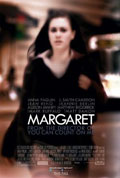
Directed by
Kenneth Lonergan
150 minutes
Rated MA
Reviewed by
Sharon Hurst

Margaret
Synopsis: Lisa (Anna Paquin) is an outspoken 17 year-old New Yorker finding her feet in an adult world. Trying to catch the attention of a bus driver (Mark Ruffalo), she causes him to lose concentration resulting in the death of a pedestrian. Although Lisa feels that she has been responsible for the death, she transfers her guilt and co-opts the dead woman’s best friend Emily (Jeannie Berlin) in initiating legal action against the driver. While grappling with this situation she is also dealing with lack of communication with her self-absorbed actress mother (J. Smith Cameron), sexual experimentation, and hostile and inappropriate relationships with her classmates and teachers (Matt Damon and Matthew Broderick).
It is a huge challenge to give a succinct review of this broad-reaching, ambitious film and to pay tribute to its strengths whilst acknowledging its few weaknesses. Margaret was shot way back in 2005, with the now departed Sydney Pollack and Anthony Minghella on the production team. Many legal wrangles and re-edits later it finally has seen the light of day.
Lonergan blew me away in 2000 with his film You Can Count On Me and he does so again with his extraordinary ability to script dialogue that is so real that one cringes in recognition of its unvarnished truthfulness. On one level it is a drama featuring a feisty adolescent girl who is at once too smart for her own good but also naïve in her self-righteous claim to the high moral ground. Her inability to cope with a shocking event causes her to lash out at herself and all those around her yet she also delights being at the centre of attention. On another. it is about the lack of communication between children and parents and how the latter’s own selfishness can blind them to their kids’ needs. Lisa’s mother Joan is so obsessed with her career and her new romance with smooth-talking Ramone (Jean Reno ) that she is unable to do much other than have bitch-screaming matches with her daughter. Her father (played by director Lonergan), on the other hand, is a literally and metaphorically distant parent.
The film is also in some small way the story of post 9/11 New York, and the city itself features large in many of the fascinating slo-mo scenes which lovingly depict its daily life, a stark contrast to the horrific opening accident scene. The arbitrary nature of human suffering is also philosophically dealt with by Lisa’s teachers who discuss poetry by Shakespeare and Gerard Manley Hopkins (one of his poems. which gives the film its title, deals with grief and provides the central theme to this film) amongst other topics. Issues of responsibility and blame loom large, as do not-so-subtle swipes at the world of litigation, with Abigail, the dead woman’s estranged cousin, symbolising the grab for financial gain that can obliterate any sense of decency.
Every performance in this film is a gem of brilliant acting, but none so unswervingly, jaw-droppingly enthralling as Paquin, who embodies everything good and bad about idealistic, smart-arsed, foul-mouthed, confused adolescence. You love her and hate her both at once but never stop feeling for her.
The dialogue-driven, messy, eclectic narrative barrels forward, at times almost out of control, but mesmerising in its authentic detailing of family life, teen relationships, teacher/pupil interactions, classroom debates and tentative sexual awakening. As a portrait of urban tragedy and life’s sorrows, Margaret is one of the best.
FYI: There is a Director's Cut which runs three hours, six minutes/

Want more about this film?


Want something different?




